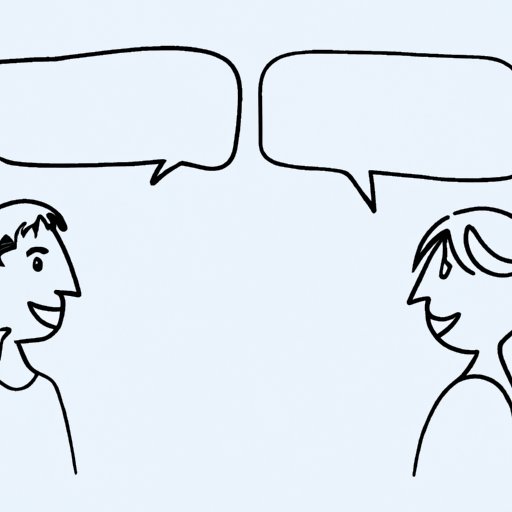Introduction
Initiating conversations can be intimidating. Whether you’re meeting someone for the first time or trying to break the ice with an old acquaintance, it can be difficult to know what to say. However, having a few conversation starters in your back pocket can make it easier to get the conversation rolling. This article will provide tips and examples for how to start a conversation, from finding common interests to making small talk to sharing personal stories.
Identify Common Interests
One of the best ways to start a conversation is to identify something you have in common. According to a study published in the Personality and Social Psychology Bulletin, people are more likely to engage in meaningful conversations when they have similar interests. Brainstorm potential topics by thinking about what kinds of activities, hobbies, or interests you both have in common.
Once you’ve identified some potential topics, ask questions about them. This will give you a chance to get to know each other better and show that you’re interested in what the other person has to say. For example, if you both enjoy running, you could ask: “What was the last race you ran?” or “What’s your favorite route?”
Ask Open-Ended Questions
Open-ended questions are questions that require more than a yes or no answer. They are a great way to get the other person talking and provide insight into their thoughts and opinions. When crafting your questions, try to avoid ones that can be answered with a single word. Instead, focus on questions that require the other person to elaborate and provide more detail.
Some examples of open-ended questions include: “What do you like most about your job?”; “What do you think is the biggest challenge facing our generation?”; “What do you think sets you apart from other people?”; and “What’s the best advice you’ve ever received?”
Use Humor
Humor can be a great way to break the ice and keep the conversation going. According to research published in The Journal of Psychology, people who use humor in conversations tend to be perceived as more likable. However, not all humor is appropriate for every situation. It’s important to use humor that is appropriate for the setting and won’t offend the other person.
Examples of humorous conversation starters include: “Do you ever feel like you’re living in the wrong era?”; “If you could invent a holiday, what would it be?”; “If you could pick one superpower, what would it be?”; and “If animals could talk, which one do you think would have the funniest accent?”
Introduce Yourself and Ask the Other Person to Do the Same
Introducing yourself is a great way to start a conversation. When introducing yourself, try to make a good first impression. Smile, be friendly, and maintain eye contact. You should also make sure to ask the other person to do the same. This will show that you’re interested in getting to know them better.
You can prompt the other person to introduce themselves by asking questions such as: “What brings you here today?”; “What do you do for a living?”; or “How did you become interested in this topic?”
Make Small Talk
Small talk is another great way to start a conversation. Popular topics for small talk include the weather, current events, sports, travel, books, music, movies, and TV shows. When engaging in small talk, try to keep the conversation light and positive. Avoid controversial topics or anything that could potentially be seen as offensive.
When making small talk, it’s important to remember to remain engaged and ask follow-up questions. This will show that you’re listening and interested in what the other person has to say. Additionally, try to avoid dominating the conversation. Allow the other person to contribute and share their thoughts and opinions.

Share a Personal Story or Anecdote
Sharing a personal story or anecdote is another great way to start a conversation. When selecting a story, make sure to choose one that is appropriate for the setting and won’t make the other person uncomfortable. Additionally, try to select a story that is interesting and entertaining so that it will keep the conversation going.
Examples of good stories include: a funny childhood memory; a unique experience you had while traveling; a memorable moment from a past job; or a funny incident that happened to a friend or family member.
Compliment the Other Person
Compliments are a great way to start a conversation and show that you’re interested in getting to know the other person. When giving compliments, make sure to be genuine and specific. Avoid generic compliments such as “You look nice” or “You’re smart.” Instead, focus on compliments that are specific to the other person, such as: “I love your outfit! Where did you get it?” or “I’m impressed by your knowledge on this topic.”
Conclusion
Starting a conversation can be daunting, but it doesn’t have to be. By identifying common interests, asking open-ended questions, using humor, introducing yourself, making small talk, sharing stories, and giving compliments, you can easily start a conversation with anyone.
(Note: Is this article not meeting your expectations? Do you have knowledge or insights to share? Unlock new opportunities and expand your reach by joining our authors team. Click Registration to join us and share your expertise with our readers.)
